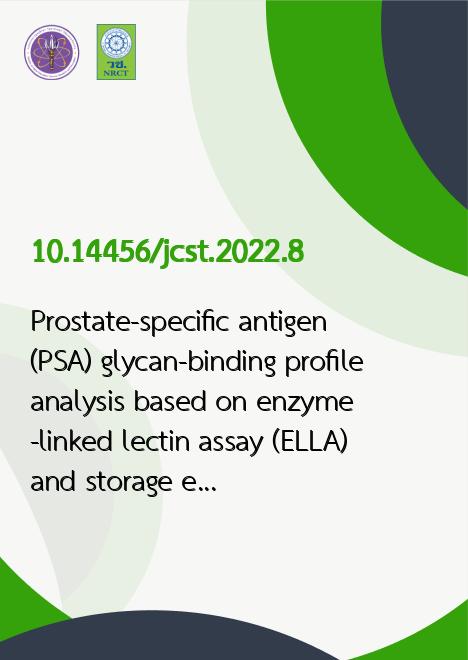
|
Prostate-specific antigen (PSA) glycan-binding profile analysis based on enzyme-linked lectin assay (ELLA) and storage effect of assay components |
|---|---|
| รหัสดีโอไอ | |
| Creator | Muhammad Ashraf Shahidan |
| Title | Prostate-specific antigen (PSA) glycan-binding profile analysis based on enzyme-linked lectin assay (ELLA) and storage effect of assay components |
| Publisher | Rangsit University |
| Publication Year | 2565 |
| Journal Title | Journal of Current Science and Technology |
| Journal Vol. | 12 |
| Journal No. | 1 |
| Page no. | 79-88 |
| Keyword | glycoprofiling, lectin assay, MAA, PSA, sialic acid, SNA, storage |
| URL Website | https://jcst.rsu.ac.th/ |
| ISSN | 2630-0656 |
| Abstract | Changes in the prostate-specific antigen (PSA) glycosylation profile may be used to distinguish indolent from aggressive prostate cancer (PCa). This study aimed to obtain the glycan profiles of PSA isolated from a normal individual using the enzyme-linked lectin assay (ELLA) method. We used sialic acid-specific lectins (MAA I, MAA II and SNA) for PSA glycoprofiling and generated the binding curve of PSA-lectin interactions. Compared to MAA I and MAA II, Sambucus nigra agglutinin (SNA) had the highest binding (A450 = 3.59) with the normal individual PSA sample harbouring α2,6-sialic acid glycan used in this study. The binding signals for Maackia amurensis agglutinin (MAA) I were significant starting at 700 ng/mL PSA, implying that a small amount of α2,3-sialic acid glycan presented in the normal PSA. Binding saturation occurred at A450 = 3.60 and at a PSA concentration of 5 × 103 ng/mL (176 nM). In addition, the stability of assay components stored at room temperature (25 °C) for two months was assessed, and the results showed that the binding signals for PSA detection by SNA were still remarkably high (A450 = 2.37) at a PSA concentration of 1 µg/mL. Here, we established a simple and sensitive lectin-based assay for PSA glycoprofiling. The stability of the assay components during the storage test also revealed their potential to be utilised and stored for longer periods at room temperature. |